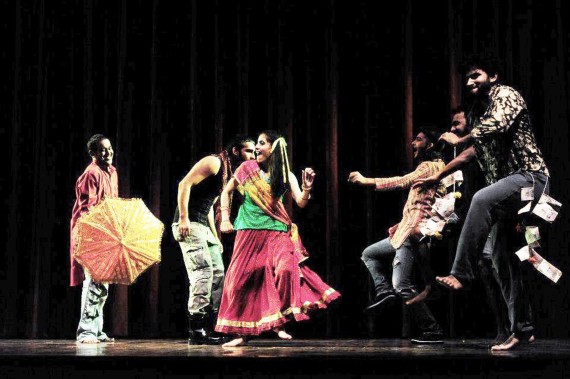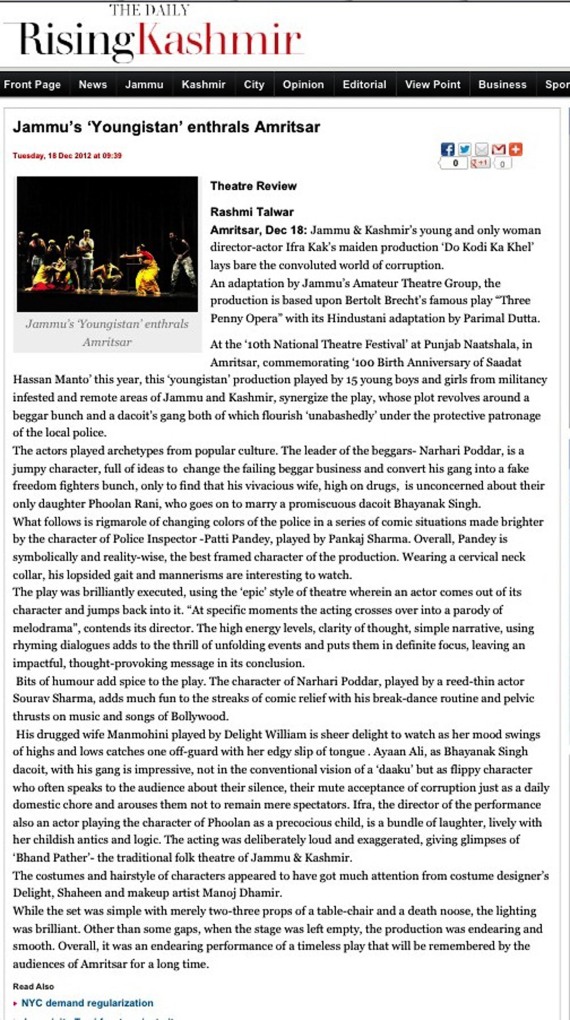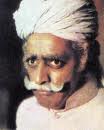EXCLUSIVE INTERVIEW
Artist understands no Boundaries: Pak’s Arif LoharBy Rashmi Talwar
Pakistan’s folk musical great Arif Lohar’s soft eyes and childish tongue poking is just a tip of his rustic moorings. It gives no glimpse of his immense talent that comes alive just as he takes on the stage, not only as a singer, but as a class performer. His entry in Coke Studio as a folk singer of Pakistan with his ishtyle of ‘Jugni’ catapulted him to the world stage. This one folk music score, endeared him across seven seas, yet his repertory of music has several gems that he unfolds during his performances. Casual and in jet black he arrives, opens his jacket to reveal his richly embellished black kurta, takes off his black ‘turley walli paag’-turban, to unleash his black locks, sings so full throated that his jaw quivers with the loud throw and at the end of it closes all glitter, returns to his original roots, as if the tamasha box has been closed tightly shut. With his rustic humor, innocence and wayward village pranks, and mast chimta he entices, he revolts and establishes his moment in the cosmos with an upbeat energy and holds the audience enthralled and swinging, winning hearts of the elite and the foot-soldier alike found RASHMI TALWAR about Pak’s folk marvel during a recent musical extravaganza ‘Amrit de Sur’ in Amritsar.
Q: Your favorite musical instrument?
Ans: I am the son of Alam Lohar a revered folk singer and I inherited the ‘Chimta’ or tongs from him. Since then the Chimta is my ‘Ishq’ –my Love, and my bread earner and my father is my ‘Zewar’ – my jewel. I have no other wealth worth anything other than my mother’s blessings, my mother-tongue my father’s musical inheritance.
Q: Were you a good student and what were some of the best moments in life?
Ans: (With a coy smile) I was a nalayak – a poor student. And as you know a good son is overlooked but a nalayak one is watched with a hawk’s eye. So I was watched closely by my mother and father besides elders in the family as to what I did. Irrespective of my zilch academic prowess, I took to music like a duck to water from my father and that became my destined path. Whether I sing for a crowd of 25,000 in New York or 100 people in a village, all these are my best moments. Other than that was being awarded the Pride of Performance award by the President of Pakistan in 2005. I grew up amongst folk instruments and flavors of folk rustic singing. Not only did my bearings give me the sound quality so typical of our tribe-kabila it also gave me a taste of earth and soil that held the fragrance of my village Achh in Pakistan.
Q: Where do you get the humor streak in your dialect, gestures and actions?
Ans: Humor is in our blood. As an entertainer, humor comes as part of the Punjabi package. If a performer is unable to involve the audience then he has failed. I love live performances just as my father did and now my son Ali Lohar whom we lovingly call ‘Laddoo Lohar’ who started performing with me from the age of 3 ½ years. “Assi lok geet tey sufi vich bhijey hoye hain. Chimtey tey hor saaz jiven algoza, ek Tara, tumba, dhol hee saadi zindagi hai” (We are soaked in folk and Sufi music. The chimta (tongs) Algoza, Ek Tara (one string) Dhol are our life).
Q: Your style of ‘throw’ is unique and unbeatable?
Ans: ‘Phenkna’- or ‘throw’ is of two types. Throw amongst musicians is the quality of voice, like how loud or far it reaches and Phenkna in the modern world also means ‘bragging’ or ‘false boastings’ (he pokes his tongue). The first one is for me as my voice has a mass throw that I needn’t use a loudspeaker during village gatherings. But what you are talking about is the action-of-throw, as if throwing a dice isn’t it? No I didn’t learn it in a bowling alley to hit nine pins (smiles sheepishly) but this is part of our folk culture and I picked it during my days in street theater and this became my signature style.
Q: Which song brought you into the limelight on the world stage?
Ans: Of course Pakistanis all over the world in more than 50 countries, enjoy folk and Sufi fare that Lohars have presented but it is the ‘Jugni’ created by me in Pakistani Ishtyle that brought me world wide recognition. ‘Jugni’ was also used in Indian film ‘Cocktail’ but was first aired by Coke studio. On the internet site ‘youtube’ the Jugni video went viral with hundreds of hits per day and then came the Bollywood film Cocktail. Following this was the hit Indian film title song of ‘Bhaag Milkha bhaag’ which had an Indo-Pak flavor as it dealt with the burnish of Partition of 1947.
Q: What is your take on hot and cold relations between India and Pakistan? Does it affect artists?
Ans: An artist’s mind is boundless. He understands no boundaries; He has no climate (smiles). His climate is created with his stage and his audience. ‘Fankar layi hawa waken ussda chimta atey tumbi hey, tey Pani Wargey uhde sunnan walley Ne. Eh Hawa-Pani da jor nal uhh rujhiya rehnda hai . Ussda ki lena-dena siyasiyat atey siyasdaan nal’ (For an artist his air is his musical instruments and water is his audience. With this combination of air and water he remains satisfied and replenished. What does an artist have to do with anything political)?
Yes, it affects artists as paths are blocked but just as you cannot block air and water so can’t you block music, more so in modern times, where music wafts through cyber space. Music is unstoppable and will play unhindered. If you have an ear for it, it will be heard in the mundane things of daily life. Music has served only to bond people and so have other arts like dance, theater, poetry. Every time something untoward happens between the two countries, I feel pained.
Q: How did the new Jugni came alive? Were you not scared that it would get a beating from the original, traditional Jugni?
I was not ready to accept that I should only follow and continue my father’s legacy in folk music. I wanted to create something of my own, my own brand -If only one can become a ‘fakir’- lost beggar, that one can become attain the stature of a real ‘fankar’- artist. If I was to follow only what has already been played then what have I added to the music world. Fired with this passion I composed the new Jugni. It became a turning point and it was like- in an ocean of music I filled my own special color. Jugni in Punjab is a mythical figure of a woman who is a rebel while I made the Pakistani Jugni as someone who is a blessing of the Almighty.
I have made my own little world, according to my likes and dislikes, I live in my world where I don’t ever give up, I keep searching. Even while sleeping I remain awake. When alone at night my mind is charged with a fire inside to do something extraordinary. And then I feel the Almighty lays his benevolent hand on such a person. Duniya ke thaperaian toh sikhyan ( I learnt from the slaps from this world) … my mother’s face is visible to me smiling and that urges me on . Her beauteous face is like a Prasad or blessed offering that I partake in blessing before I go and perform on stage.
Q: It is well known that you were a street actor before taking to singing full time. Which do you like more?
I did street plays mostly comical in the entire countryside of our Punjab called nukkar nataks and nautanki. Besides that I used to be mast singing into nights. Village folk used to bring some food that they would eat through the night while listening to me and would go to feed their cattle early morning from this mehfil and I remember it was my guru Master Ismile of theater who taught me the nitty-gritty of theater and catching the audience’s attention. I use those rustic knick-knacks liberally in my performances.
The recognition, the money, the accolades were of no consequence. To please my audience was my goal. My mother told me you have to search your own path and then I shall be proud of you. So I took the fakiri path and sang in trucks and even in village trolleys. People hardly paid and then I started to include antics of theater which turned the tide and established me as a singer-performer along with my father.
Acting added to my performances and then I acted in more than 40 Pakistani films. Syed Noor’s film Jugni (film) was the highest grossing Pakistani film of 2012 with three of my songs. 150 albums and more than 3000 songs have been recorded, mostly in the Punjabi language and I still feel charged to do more.
Q: As a child which was your favorite song? Share something about your childhood
Ans: “Kookla chapaki jumey raat ayi hai, Jera agey pichey dekhe uhdi shamaat ayi hai” was my favourite which was typical Punjabi sung in Punjabs of both India and Pakistan.
Q: Your favorite numbers other than jugni?
Ans: ‘Ankhon toh bhul hoyi, pyar kar beethey hain’ and ‘Ek phul motiye da mar ke jagah soniye!’ both are my own creations.
Q: How do you describe yourself?
Ans: I am a mauji, a faqir as my mother wanted me to be. Yet I follow asool-discipline. My life is tough and rough and I can take the rough and tumble with a pinch of salt.
Q: Who is your favorite singer?
Ans: My Favorite singer is India’s nightingale Lata Mangeshkar Ji. On the Pakistani side other than my father’s melody, I love Nusrat Fateh Ali Khan, Rahat Fateh, Atif Aslam, and Reshma. I identify with them.



















Recent Comments